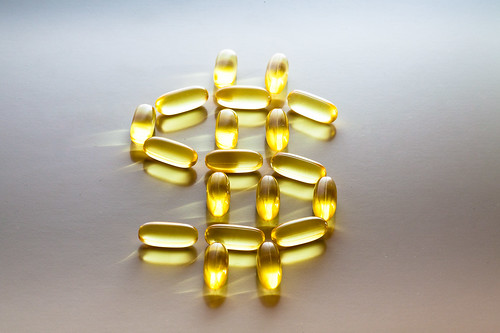December 2012
 |
| Fish oil capsules. Photo by jcoterhals on Flickr. |
Scientists in Cambridge have
found scientific support for what many would consider common-sense.
After reviewing 38 studies
involving 800,000 people in 15 countries, they confirmed that a diet
rich in fish consistently had a protective effect against
stroke. Previously such findings have been attributed to the high
omega-3 fatty acids in fish oils, and a huge industry has sprung up
selling fish-oil capsules to health-conscious people. However, the
scientists further concluded that taking such supplements made
no difference in preventing strokes.
The lead author, Dr. Chowdhry, points out that fish has many important nutritional substances besides oil, such as vitamin D and selenium. He suspects that all kinds of fish, not just the oily fish recommended by nutritionists, have beneficial effects, providing they are not fried in fat. He said
“It's helpful for the public to know whether we should go down the route of a food-based approach or a nutrient-based approach. It does seem it is mainly the food that is more beneficial.”
This is bad news for the
biotech industry. One of its main hopes to rescue its GM dream from
public rejection is to produce plants whose oil is like fish-oil.
All the evidence now points to this being just another, even more
artificial, supplement than any which has gone before, and the
benefits are in doubt.
Like vitamin
supplementation, artificial omega-3 fatty acids may still be
beneficial to ameliorate certain disease conditions such as
diabetes and cognitive failures. However, to maintain health, you
need natural food.
OUR COMMENT
The biggest concern about
the second-generation nutritionally altered GM crops is that a GM
food with a 'healthy' oil content might turn out to have singularly
unhealthy side-effects due to
their disturbed metabolism.
The
side-effect of most concern is allergies. Fish allergies are thought
to affect 0.4% of the population in America. Unlike childhood
sensitivities to wheat, egg and dairy which tend to resolve with age,
reactions to fish are generally life-long.
What are
the chances that GM plants with fish-like oil will not only fail to
protect health, but will also produce fish-like allergens? If this
sounds far-fetched, there are two published studies which reported
finding a very unexpected allergen in GM plants. In 1996, a Brazil
nut gene for a type of albumin known not to be allergenic induced
Brazil nut allergenicity when inserted into soya beans. In 2005, a
bean gene for an insecticidal protein known not to be allergenic was
found to produce immune responses in test mice when inserted into
peas. More worrying, the bean protein produced by GM peas induced
reactivity to albumin, a common protein.
Allergenicity
assessment has simplistically focused on the GM protein alone, and
largely on whether it has any similarity to other known allergens.
Clearly
nutritionally-enhanced GM food of any kind needs extensive clinical
trials to see if the
presence of the artificial nutrient is actually producing the desired
health-effect, and to see if there are any unexpected allergens
emerging in the novel plants. Without such studies,
second-generation biotech 'health'-foods may be, at best, useless,
and at worst dangerous.
For
another take on this, check out CHOICES NO ONE WANTS - November
2012.
SOURCES:
- Chris Smyth, A fish oil capsule a day lets the health benefits get away, The Times, 31.10.12
- Amy M. Branum et al., Food allergy Among U.S. Children: Trends in Prevalence and Hospitalizations, U.S. Department of Health and Human Services , Centers for Disease Control and Prevention, National Center for Health Statistics Data Brief No. 10, October 2008
- Food Allergy facts and Statistics for the U.S., The Food Allergy & Anaphylaxis Network, www.foodallergy.org accessed October 2012
- Vanessa E. Prescott, et al., 2005, Transgenic Expression of Bean α-Amylase Inhibitor in Peas Results in Altered Structure and Immunogenicity, Journal of Agricultural Food Chemistry, 53
- Julie A. Nordlee et al., 1996, Identification of a brazil-nut Allergen in Transgenic Soybeans, New England Journal of Medicine, 14.03.96
No comments:
Post a Comment
Thanks for your comment. All comments are moderated before they are published.